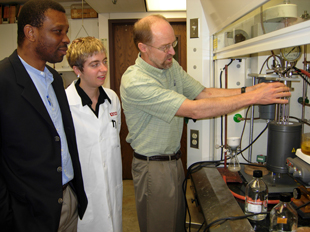 |
Jonathan Vennerstrom, Ph.D., far right, talks about some of the lab equipment that was funded by the Medicines for Malaria Venture. Joining him are Solomon Nwaka, Ph.D., manager of genomics and discovery research, World Health Organization, and Julia Poplavskaya, Ph.D., a researcher in Dr. Vennerstrom’s lab. |
Dr. Vennerstrom and his team of scientists from UNMC, Monash University in Australia, and the Swiss Tropical Institute in Basel, Switzerland, have received a $1 million grant that will enable them to develop a new antimalarial drug.
Funding was granted by Medicines for Malaria Venture (MMV), a nonprofit organization based in Geneva, Switzerland. MMV receives the majority of its funding from the Bill and Melinda Gates Foundation. The grant is renewable each year.
“We’re excited,” said Dr. Vennerstrom, professor of pharmaceutical sciences in UNMC’s College of Pharmacy. “But there’s still a ways to go. Our new compounds appear to be better than the first-generation ozonides. They seem to have longer half lives – they stay in the body longer, and we think it will be possible to use a single dose.”
Dr. Vennerstrom’s team discovered and developed an antimalarial drug candidate that is currently in clinical trials overseas. The compounds they are studying now in the lab may prove to be superior then those in clinical trials. Researchers think the latest compounds may be cheaper, more effective and can be developed into a single dose anti-malarial medication.
“People don’t always take the second dose as indicated; therefore, they don’t get the proper treatment. With only one dose, it will be easier to get patient compliance. It’s also cheaper, which is very important,” he said.
“Dr. Vennerstrom and his talented team have made an invaluable contribution to the development of the synthetic peroxide (OZ277/RBx11160) which is currently being tested for efficacy in malaria patients in Asia and Africa,” said J. Carl Craft, M.D., chief scientific officer at MMV. “His team is also making fantastic progress on the development of a new generation of peroxides which has the goal of curing malaria with a single dose.
“If they are successful, such a treatment could revolutionize antimalarial treatment. A one-dose cure could be instrumental in saving millions of lives, particularly in the poorest regions where health care is scarce and the health system is inadequate.”
Malaria kills more than 2 million people each year in places such as Africa, Asia, Central and South America, according to the World Health Organization. In addition, an estimated 300 million to 500 million new cases of malaria are diagnosed each year. More than 90 percent of all malaria cases occur in Africa. Also at risk are those who travel to countries where malaria is prevalent.